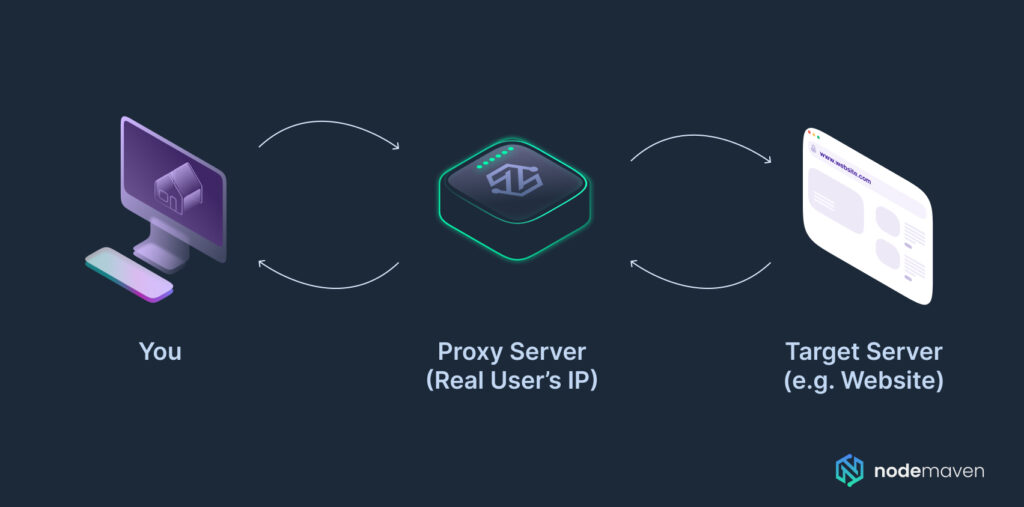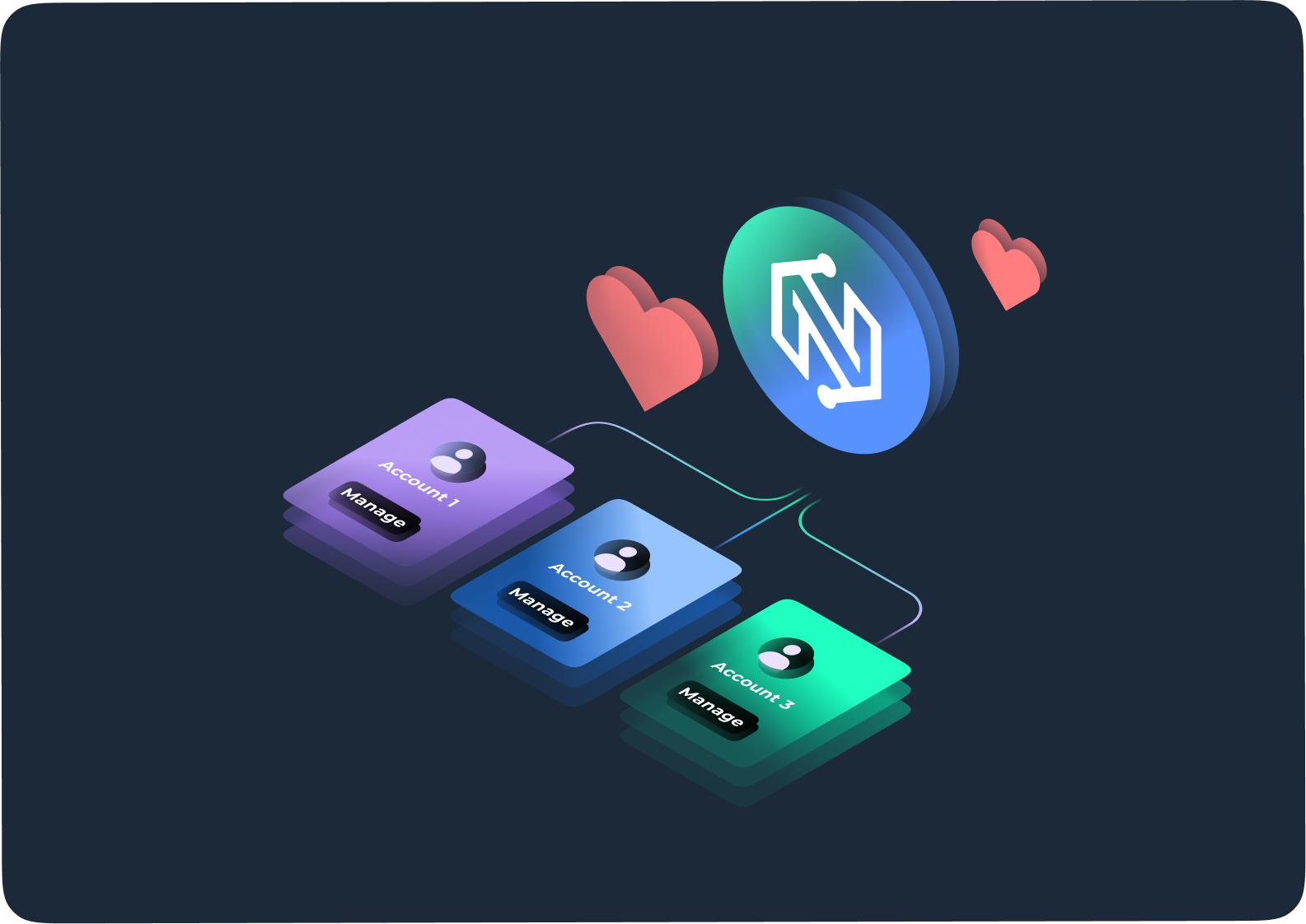Not sure whether to use a proxy vs VPN for your business?
In this guide, we’ll break down the key differences between residential proxy vs VPN, and help you figure out which one fits your needs best.
What Are Residential Proxies?
Residential proxies are IP addresses assigned by real Internet Service Providers (ISPs) to real users. These are the same types of IPs used by people at home, not from data centres or virtual machines.
Because they come from genuine devices like phones and laptops, residential proxies appear highly trustworthy to websites. This makes them ideal for tasks where staying undetected is critical.
How Residential Proxies Work
When you use a residential proxy, your connection is routed through a real user’s IP address. To the target website, it appears to be a normal browsing session and behaviour from someone at home.

This helps you:
- Reduce bans and CAPTCHAs
- Access geo-restricted content
- Perform large-scale scraping
- Manage multiple accounts safely
Tip: To reap all the benefits of residential proxies, use high-quality proxies that are not overused. NodeMaven offers only pre-filtered, clean IPs.
Typical Residential Proxy Use Cases: Account Management, Ad Verification and Data Collection
Business or digital professionals usually prefer residential proxies over VPNs for such tasks as:
- Web scraping: Collecting public data at scale without being blocked
- Multi-account management: Running a bulk of profiles on platforms like Facebook, TikTok, or Instagram without linking them
- Ad verification: Setting and checking localised ads from different regions to detect fraud or monitor performance
Want to learn more about residential proxies? Check out our full guide: What Are Residential Proxies and How They Work
What Is a VPN and How Does It Work?
A VPN (Virtual Private Network) is a tool that creates a secure, encrypted connection between your device and the internet.
When you use a VPN, your real IP address is hidden, and your traffic is routed through a server run by the VPN provider. This makes it appear as if you’re browsing from that server’s location, not your actual one.
The main goal of a VPN is privacy. It keeps your browsing activity hidden from your internet provider, potential hackers, or anyone else monitoring your network.
Typical Use Cases of VPNs
VPNs are popular for everyday internet users who want more control over their privacy. The most common reasons to use a VPN include:
- Hiding your IP address while browsing
- Accessing geo-blocked content (like watching a show or video service that’s only available in another country)
- Using public Wi-Fi safely (especially when travelling)
- Avoiding tracking by websites and ad networks
While VPNs offer a good level of anonymity, they’re usually not designed for high-scale or automation-heavy tasks. That’s where proxies, especially residential proxies, come in.
Key Differences Between Residential Proxies and VPNs.
Now, when we reminded you of the core definitions, let’s finally take a look at the differences.
Both VPNs and residential proxies help hide your IP address and improve privacy, but they’re built for very different goals. Let’s break it down.
Key Technical Differences: Residential Proxy vs VPN
| Feature | VPN | Residential Proxy |
|---|---|---|
| IP Type | Static/shared IP from a VPN server | Real residential IPs from ISPs |
| Encryption | Encrypts your entire internet connection | Routes only browser/app traffic |
| Speed | Can be slower (due to encryption) | Often faster for task-specific use |
| Rotation | Typically static (no rotation) | Auto-rotating or sticky sessions |
| Use Cases | Personal browsing, privacy | Scraping, ads, account management |
VPNs are best if you just want privacy and security while browsing the internet or accessing blocked websites.
Residential proxies are designed for business workflows, like:
- Running multiple accounts without getting flagged
- Scraping data without hitting rate limits
- Testing ads in different cities
- Collecting localised content at scale
Still can’t decide which one better suits your use case? Let’s take a better look at some practical differences and compare residential proxy vs VPN parameters.
IP Rotation vs Static IP
- With a VPN, you usually get one IP per connection. That’s fine for personal use.
- With residential proxies, you can rotate IPs automatically or use a sticky IP that stays active for 10, 30, even 60+ minutes. Great for automation and managing sessions without interruptions.
Geo-Targeting Precision
- VPNs might let you choose a country, but not a specific city or network.
- Residential proxies (especially from NodeMaven) let you target:
- Cities
- ISPs
- Mobile carriers
This is the key parameter for things like:
- Running local ad campaigns
- Monitoring regional search results
- Accessing hyper-local services
Speed & Performance
- VPNs encrypt everything, which adds security but can slow down your connection.
- Proxies route only specific traffic, which means:
- Faster speeds
- Less lag
- Fewer failed requests
Note: VPN = Privacy for everyday browsing.
Residential proxy = Performance and scale for business tasks.
Why Businesses Prefer Residential Proxy vs VPN
1. Residential Proxies Make Scaling Easier
VPNs are built for individuals — one connection, one IP. But businesses need more.
With residential proxies, you can manage hundreds of IPs, rotate them automatically, or keep them “sticky” for longer sessions. Perfect for running scripts, managing multiple accounts, or collecting large amounts of data with much less manual work.
2. Proxies Are Less Likely to Get Blocked
Websites can usually tell when you’re using a VPN, and they often block or limit your access.
Residential proxies use real IPs from real devices, which look like regular users. This makes it much harder for platforms to detect you or flag your activity.
3. More Precise Targeting
VPNs might let you choose a country. But what if you want to appear as a real user in New York, or on a specific mobile carrier in Paris?
Residential proxies (like the ones from NodeMaven) let you choose cities, ISPs, and even mobile networks, giving you accurate control for ad testing, local SEO, or price monitoring.
4. Work Better for Automation
If your business involves automation, bots, scraping, or multi-account setups, proxies are the way to go. Proxies let you run automated workflows at scale, without raising red flags.
VPNs don’t rotate IPs and aren’t designed for automation.
NodeMaven’s Residential Proxies: Built for Business Use
At NodeMaven, we don’t just sell proxies. We design them for strong business performance. Whether you’re scraping data, managing accounts, or running localised ad campaigns, here’s why our residential proxies stand out:
Clean, High-Trust IPs Only
Our IP Quality Filter ensures every proxy you use has a clean track record.
That means fewer bans, fewer CAPTCHAs, and more successful requests.
Super Sticky Sessions
Need an IP that stays the same for longer? Our Super Sticky Sessions let you hold a connection for 10, 30, or 24 hours. Perfect for logins, checkouts, or tools that don’t like switching IPs mid-task.
Traffic Rollover and No Wasted Bandwidth
Didn’t use all your data this month? No problem.
With Traffic Rollover, your unused traffic rolls over to the next billing cycle, so you only pay for what you actually use.
Easy Setup with Smart Configuration
Our guided onboarding tool helps you set everything up in minutes. Just tell us how you plan to use the proxies (scraping, testing, managing accounts), what integration tool you use, and we’ll configure the best setup for you.
Final Thoughts: Choose the Right Tool for the Job
Let’s quickly recap on residential proxy vs VPN:
- VPNs are great for personal privacy, basic browsing, and keeping your internet connection secure.
- Residential proxies are built for business. They give you more control, better targeting, and help you scale tasks like scraping, automation, and managing multiple accounts.
If you’re not doing anything more complex than watching videos or checking your email, a VPN might be enough.
But if your work depends on things like speed, stability, and reducing bans, residential proxies are the best choice for you or your team.
NodeMaven’s residential proxies give you exactly that: a reliable, flexible tool that makes your business tasks easier and more efficient. Start with our trial and see for yourself.


